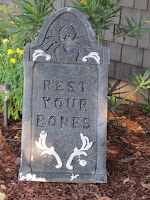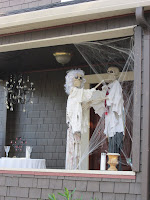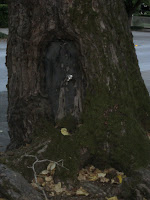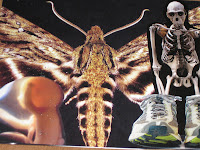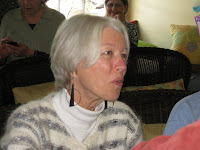
I woke in a cold sweat from a dream not long ago. When I'd worked my way back to consciousness, and was able to replay the dream in my head, I got a bad case of giggles. Bargaining with myself so I could get back to sleep, I promised to turn it into a short story in the morning. Hope you enjoy.
Jill turns off her printer and extracts the seven pages of her novel in progress, Live Wire, a story loosely based on growing up in a family of schizophrenics. Fiction allows her some emotional distance in a way that memoir doesn’t. She’s been working on the manuscript since the writer’s group, Friday Night Live—a collection of characters fit for a novel, all striving to be writers—began a year ago, and has promised herself she will have it ready to send to an editor before she turns sixty, which gives her exactly three weeks.
She stuffs the pages in her book bag, grabs her keys, wallet, and a bottle of Champagne that has been chilling in the refrigerator, and is out the door when Jonathan honks the horn of his Toyota in front of her house. She turns the key in the lock, and pats the door with affection. “Back soon,” she says. Jill has an odd relationship with her dilapidated little cottage. They are like an old married couple, used to each others ways, each becoming slightly more decrepit with age. Jill has never married and has no interest in partnering up just because she is getting old.
Jonathan is a forty-year-old bachelor who, if he had been born a woman, would have been described as
Zaftig. As it is,
pasty will have to suffice. He avoids the sun, as do many redheads, and avoids exercise, as do many men with mid-life paunch. He is the sole representative of the male gender in the writer’s group, and considers it an honor and a responsibility. Jonathan is working on a book called, “The Feminist Male.”
Every Friday, they rotate homes so no one will be overly burdened by the task of hosting. This week, they are on their way to April’s house. The last meeting was at Catherine’s, an upscale artisan cottage with skylights that allowed the light of the full moon to drench the dark walnut floors. Catherine is fifty, and writes Haiku, a style of poetry that leaves Jill scratching her head at the complexity of this simple form. Last week, Catherine’s butch lesbian lover, Hanna, served them grilled oysters on the half-shell, a cheese and fruit platter, and French bread.
Two weeks before that, they had met at Margie’s, a tract home in a noisy neighborhood. Margie’s husband, Tom, had failed miserably at keeping their four children contained upstairs for the two hour writer’s meeting, and they’d been interrupted frequently by requests for snacks, lost puzzles, books to be read, and questions that apparently only a mom could answer. Margie, forty, stocky, with curly brown hair that defied capture in the clip she continually adjusts, swore this was the last time they’d meet in her home, and apologized profusely on her way through the room to meet yet another child’s request. Margie writes children’s stories in her spare time.
“You have the address, right?” Jonathan says by way of greeting, as Jill slides into the passenger’s seat.
“Yeah, I spoke with April this afternoon. I can’t wait to see her new apartment.”
“God, I hope she’s not depressed,” Jonathan mumbles. “I never know what to say to women who are depressed—or who are having cramps,” he adds.
“Maybe that could be a chapter in you book,” Jill suggests.
Jonathan pulls up in front of a non-descript townhouse, in a non-descript segment of the city—neither old, nor new—and turns off the ignition. He shoots Jill a baleful look and says, “Well, let’s get this over with.”
April, in her mid-forties, recently divorced from a prominent orthodontist, has downsized from a multi-level, Frank Lloyd Wright home—with water features—in the hills, to a shared rental in the flatlands. She writes memoir, and has plenty of material, having lived the last ten years with an alcoholic sex addict. It is her new-found freedom and safe living space the writer’s group is celebrating this evening.
They knock on the door. Jill plasters a smile on her face and holds the Champagne in front of the peephole.
A stunning woman, sixty-ish, in a flowing hostess gown answers the door. Her quizzical expression is answered by Jonathan in a fit of over-gregariousness.
“Ah, you must be the roommate,” he smiles, and introduces himself and Jill. “We’re here for the . . . ” his voice trails off, as he notices a large gathering of people in the living room, none of whom appear to be Friday Night Live members.
“Surprise birthday party,” the woman completes his sentence. “I’m Francesca, please come in,” she says, and motions in them into the throng. “She isn’t here yet, but she’s due any minute.”
“Oh dear, we had no way of knowing,” Jill says. “There are two more of us coming. I hope we don’t ruin the surprise. I thought her birthday was in January,” Jill stammers, handing the hostess the Champagne.
“No, I’m pretty sure it’s tonight,” Francesca says. “Go on in and introduce yourselves around.” She takes the Champagne to the kitchen.
“It’s not so bad,” Jonathan says, looking around. “A little cramped, but do-able.”
“Good heavens, they’re all unpacked,” Jill notes. “It takes me weeks when I move. I wonder where Catherine and Margie are,” she says, glancing over her shoulder.
Francesca comes back over to them and says, “I’m a terrible hostess. I’m sorry, I don’t even know how you know her,” she smiles.
“We’re in her writer’s group, the one that meets every Friday night,” Jonathan explains.
“Oh, I didn’t even know she wrote. Just when you think you know someone . . .” she laughs merrily. “Excuse me,” she says, and leaves to answer another knock at the door.
Jill and Jonathan wander into the dining room. “Wow, look at this spread,” Jonathan says. He dips a jumbo shrimp into a tangy sauce and takes a bite. A parenthesis of catsup attaches itself to the corner of his mouth.
“Do you think we ought to call Catherine and Margie and see what’s holding them up?” Jill glances at her watch. Without waiting for a response, she opens her cell and dials Catherine’s number.
“Hey, where are you?” Catherine answers.
“We’re here,” Jill says, “where are you?”
“Out back,” Catherine replies. “We’ve been waiting for you. Did you remember the Champagne?”
Jill motions to Jonathan to follow her, and moves through the crowd toward the back patio. “Yes, I handed it to Francesca when we came in.”
“Who’s Francesca?” Catherine asks.
“April’s roommate. Didn’t you meet her?” Jill says, sliding the plate-glass door open and stepping onto the patio. “I don’t see you,” she says, scanning the outdoors crowd.
“I don’t see you either,” Catherine says, “and her roommate’s name is Fred. Where are you?”
Just then a cacophonous cry rises up from inside the condo. “Surprise!” People are yelling and clapping, noisemakers are being twirled about. Confetti is tossed in the air and rains down soundlessly.
“Happy Birthday,” Jonathan yells, carried away by the infectious energy of the crowd.
“Is that Jonathan?” Catherine asks. “Whose birthday is it?”
“April’s?” Jill says, suddenly unsure of anything. A fine layer of sweat breaks out over her skin and chills quickly in the night air.
“April, is it your birthday?” Catherine asks on the other end of the phone. The muffled answer is “No. Why?”
“Oh my God, Jonathan,” Jill says, poking him in the arm, “we’re in the wrong house.”





